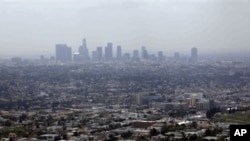A four-year international study has found the soot produced by diesel engines and wood-burning stoves is the second-greatest human contributor to climate change. That assessment of its effect, by a multinational team of 31 experts, is nearly twice what the United Nations estimated five years ago.
Known as black carbon, soot now ranks ahead of methane gas, behind carbon dioxide as a cause of atmospheric warming, especially over the Arctic.
Unlike carbon dioxide, which can endure in the atmosphere for centuries, black carbon only lasts for a few days. The new study, published in the Journal of Geophysical Research - Atmospheres, suggests that focusing on its sources could be an efficient approach to curbing global warming.
The authors say the polluting effect from diesel engines and possibly residential biofuels is strong enough that eliminating all emissions from these sources would actually produce a cooling effect.
The tiny particles are also a major component of urban air pollution, associated with respiratory illnesses. Recognizing that, last month, the United States tightened limits on soot pollution from power plants, diesel engines and burning wood.
Some information for this report was provided by AP, AFP and Reuters.











